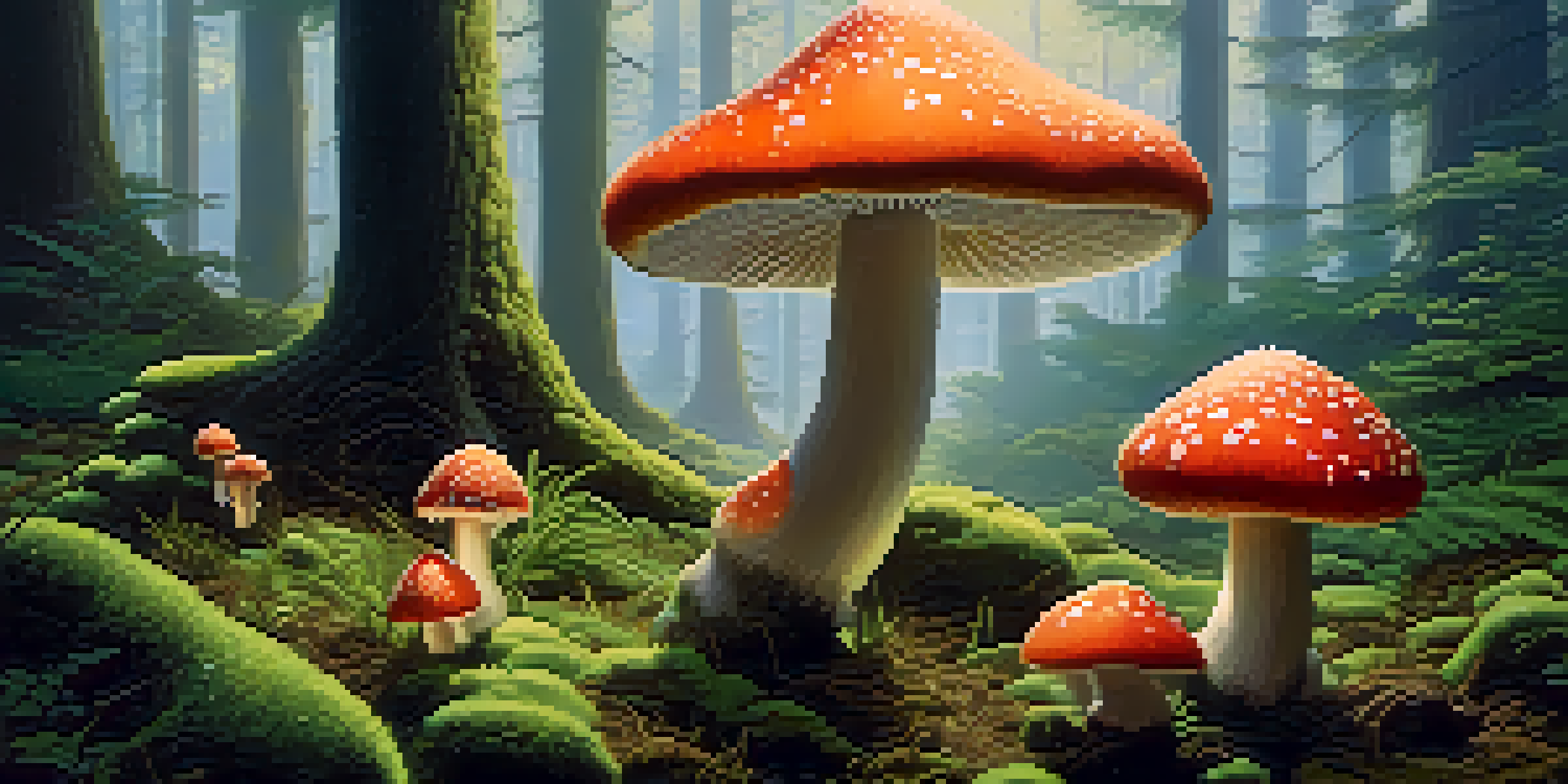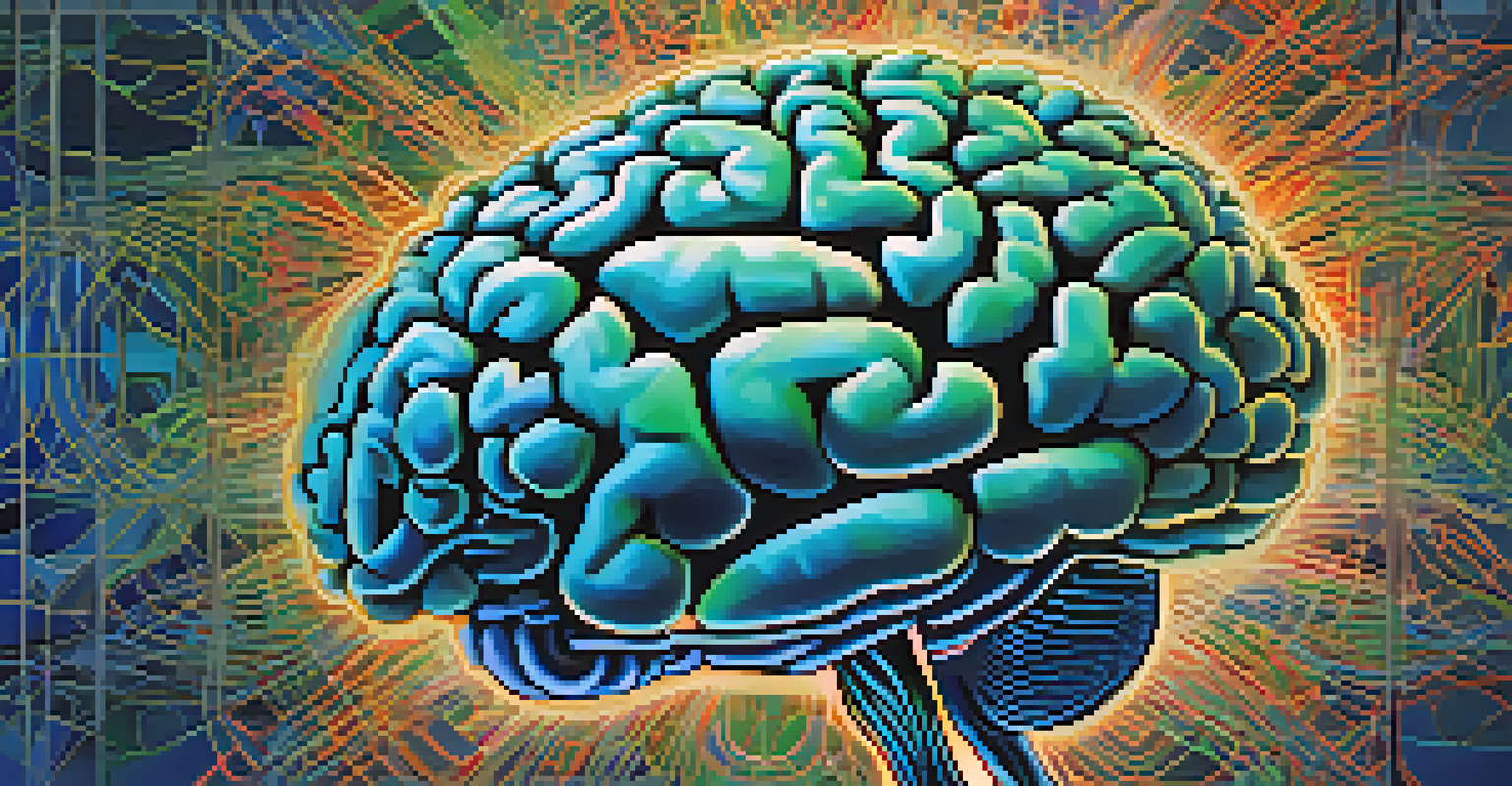The Science Behind Entheogens and Cognitive Flexibility

What Are Entheogens and Their Historical Use?
Entheogens are substances that can alter consciousness, often used in spiritual or religious contexts. Common examples include psilocybin mushrooms and ayahuasca, which have been utilized for centuries in various cultures. These substances are believed to facilitate profound insights and connections to the universe, leading many to explore their potential benefits beyond traditional use.
The greatest discovery of my generation is that a human being can alter his life by altering his attitudes.
Historically, indigenous peoples have employed entheogens in rituals and healing practices, aiming to connect with the divine or seek guidance. This deep-rooted connection reflects an understanding of the mind's complexities and the potential for altered states to spark new ideas. Modern interest in these substances has surged, particularly in the realms of psychology and neuroscience, as researchers investigate their cognitive impacts.
As society shifts towards a more open conversation about mental health and wellness, understanding entheogens' historical framework is crucial. It not only sheds light on their significance but also sets the stage for exploring their potential in enhancing cognitive flexibility, which is the ability to adapt one's thinking in the face of new information.
Understanding Cognitive Flexibility: A Key to Adaptability
Cognitive flexibility refers to the mental ability to switch between thinking about different concepts or to think about multiple concepts simultaneously. It plays a pivotal role in problem-solving, creativity, and adapting to new situations. Imagine it as the brain's ability to dance between different ideas, seamlessly adjusting to the rhythm of changing environments.

This adaptability is increasingly recognized as essential in our fast-paced, ever-evolving world. Individuals with high cognitive flexibility are better equipped to navigate challenges, respond to unexpected changes, and innovate. By fostering a flexible mindset, we can enhance our capacity to learn and grow, both personally and professionally.
Entheogens and Spiritual Insights
Entheogens, like psilocybin and ayahuasca, have been historically used in spiritual contexts to enhance consciousness and facilitate profound insights.
Researchers have found that cognitive flexibility can be influenced by various factors, including environment, experiences, and even substances. This raises the intriguing question: Can entheogens, with their profound effects on consciousness, enhance our cognitive flexibility and help us become more adaptable thinkers?
The Neuroscience of Entheogens: How They Interact with the Brain
Entheogens primarily interact with serotonin receptors in the brain, particularly the 5-HT2A receptor. This interaction can lead to altered perception, emotional release, and a sense of interconnectedness. It's like tuning into a different frequency of brain activity, allowing for novel thoughts and perspectives to arise.
Creativity is intelligence having fun.
Studies using brain imaging have shown that under the influence of entheogens, areas of the brain typically associated with self-referential thinking and ego dissolution become highly active. This activity may facilitate a break from rigid thought patterns, promoting a more fluid and open-minded approach to problem-solving and creativity. Imagine your brain as a tightly wound coil; entheogens can help loosen that coil, allowing for a more flexible flow of ideas.
Furthermore, the release of neurotrophic factors like brain-derived neurotrophic factor (BDNF) during entheogen experiences might promote neuroplasticity. This means that not only do these substances facilitate a temporary shift in thinking, but they may also contribute to long-lasting changes in how we process information and approach challenges.
The Role of Entheogens in Enhancing Creativity
Creativity is often seen as a product of flexible thinking, allowing us to connect disparate ideas and generate novel solutions. Research suggests that entheogens can stimulate creative thinking by allowing us to break free from conventional thought patterns. When we let go of rigid frameworks, new connections can be made, much like finding hidden paths in a familiar forest.
Many artists, musicians, and writers have historically turned to entheogens for inspiration. The altered states of consciousness they induce can lead to unexpected insights and a deeper exploration of one's creative potential. For example, the famous surrealist painter Salvador Dalí was known to experiment with hallucinogens to unlock his imaginative processes.
Cognitive Flexibility and Adaptability
Cognitive flexibility is crucial for adapting to new situations, and entheogens may enhance this mental ability by promoting open-mindedness and creativity.
However, while entheogens can enhance creativity, it's essential to approach their use mindfully. The experiences can vary widely, and not all encounters will lead to positive outcomes. Understanding the balance between exploration and caution can help individuals harness the creative benefits of entheogens effectively.
Potential Risks and Ethical Considerations of Entheogen Use
While entheogens offer promising benefits for cognitive flexibility and creativity, they are not without risks. Individuals may experience adverse psychological effects, particularly if they have underlying mental health conditions. It's essential to approach their use with caution and ideally under the guidance of a trained professional.
Ethically, the increasing interest in entheogens raises questions about accessibility, cultural appropriation, and informed consent. Many indigenous cultures have used these substances for centuries, and it’s crucial to honor their traditions and knowledge. Respecting these cultural contexts ensures that the exploration of entheogens is not only safe but also ethical.
Moreover, as research progresses, establishing clear guidelines for safe and responsible use becomes paramount. This includes understanding the context in which these substances are used, the potential for abuse, and the importance of integration post-experience. By addressing these considerations, we can navigate the complexities of entheogen use while maximizing their benefits.
Real-Life Applications: Entheogens in Therapy and Personal Growth
Recent studies have begun to explore the therapeutic potential of entheogens in treating conditions like PTSD, depression, and anxiety. In controlled settings, these substances have shown promise in facilitating breakthroughs in therapy, allowing individuals to confront and process traumatic experiences. This therapeutic approach highlights the potential for entheogens to foster cognitive flexibility, enabling clients to view their challenges from new perspectives.
Personal growth is another area where entheogens have gained attention. Many individuals report transformative experiences that lead to greater self-awareness, emotional healing, and improved relationships. By breaking down mental barriers, entheogens can create space for reflection and understanding, much like a personal retreat that opens the mind to new possibilities.
Therapeutic Potential of Entheogens
Recent studies show that entheogens can be beneficial in therapy, particularly for conditions like PTSD and depression, by fostering cognitive shifts and personal growth.
However, it’s essential to approach these applications with care. Integrating entheogen experiences into everyday life requires support, guidance, and a clear intention. By doing so, individuals can harness the insights gained during these experiences to foster lasting change and growth.
The Future of Entheogen Research and Cognitive Flexibility
As interest in entheogens continues to grow, so does the potential for innovative research. Scientists are increasingly investigating the long-term effects of entheogen use on cognitive flexibility, creativity, and mental health. This research could pave the way for new therapeutic approaches and a deeper understanding of the human mind.
Emerging studies are focusing on how controlled use of entheogens can enhance cognitive functions across various populations, including students and professionals. Imagine a future where workshops integrate these substances into creative processes, helping teams think outside the box and tackle challenges with renewed vigor.

Ultimately, the future of entheogen research holds great promise for enhancing cognitive flexibility and fostering creativity. By continuing to explore their potential, we can unlock new pathways for personal development, mental health, and innovative thinking, enriching our understanding of the mind and its capabilities.